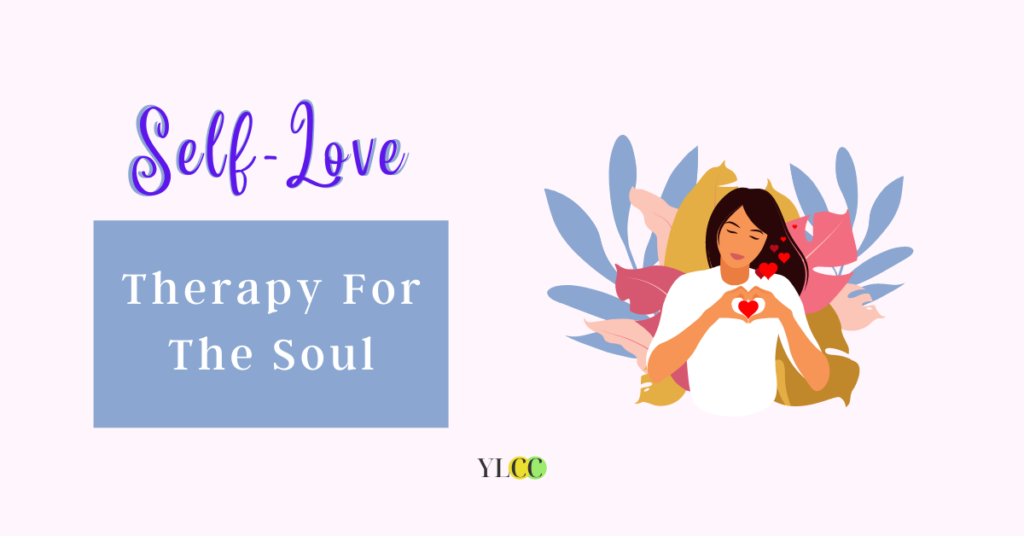
Introduction
Self-love might feel selfish in a society where we’ve been taught to put others first. We struggle to sustain a focused self-love practice because leaving aside time for self-love creates guilt. We understand the importance of self-love, yet we have a hard time allowing ourselves to experience it. The act of appreciating one’s own pleasure and well-being is known as self-love. Self-love is a type of acceptance that may be characterized as an unwavering sense of support and caring for oneself, as well as compassion for oneself. It may also be defined as a readiness to fulfill one’s own needs, allow for non-judgmental thinking, and regard one’s own self as fundamentally worthwhile, good, useful, and worthy of fulfillment. As we have learned to prioritize others; as we have learned the value of achievement and to put in long hours and earn money, yet we did not learn how to keep ourselves nourished for the voyage. Self-love is the gasoline that keeps us going; it’s the basis of who we are. Everything is built on top of this foundation, and life seems unsteady if it is not strong.
Among peers, it is often difficult to emphasize on being “different,” “or not reinventing one self,” and “being fearlessly you”. But these are insufficient to sustain the concept of self-expression of love. It takes people a long time to understand the distinction between self-love and selfishness. This article attempts to offer thoughts and knowledge in the hopes of showing you something about these two notions and how to nurture self-love rather than selfishness.
There are some triggering questions which actually leads you to realize your inner feelings –
- Is it very hard for you to say ‘NO’ to someone easily?
- Do you try to fix others’ problem, by ignoring yours?
- Do you think putting yourself first for a change would make you ‘borderline’ selfish?
- How often do you feel zero confidence level? Every time or sometime?
- Do you suffer from inferiority complexes?
If you answer ‘Yes’ for most questions, it is perhaps because the fear of selfishness is stopping you from conveying self- love.
Why is it important to Love Yourself?
Being in love with oneself gives you self-assurance, self-worth, and makes you feel more optimistic in general. You may also discover that falling in love is simpler after you have learned to love yourself. You will learn true happiness and also learn how to best take care of yourself if you can learn to love yourself.
When you are genuinely happy, you should stop comparing yourself to others and become more confident, indifferent to uninvited opinions of those around you. Self-compassionate people have been proven to be better capable of overcoming unpleasant life situations, than those who are tougher on themselves. Because it can help individuals identify the impact of bad habits and behaviors (such as procrastination) without leading to an excessively negative thought pattern, the capacity to affirm oneself has also been linked to increased problem-solving abilities and decreased procrastination.
Loving yourself may also help to reduce the chance of developing mental health difficulties including depression, anxiety, personality disorders, and perfectionism. This exercise may also boost one’s optimism and aid with stress relief, especially when faced with a variety of life obstacles. People who cultivate kindness and compassion on an individual basis first may be better equipped to express kindness and compassion to others and are more inclined to do so, since the ability to love and care for oneself typically suggests a stronger ability to love and care for others. It is common for people to have times of increased confidence and self-esteem followed by periods of decreased confidence and self-esteem. After failing at a crucial task or assignment, one may begin to doubt one’s own competence and value. Self-love is viewed as a continuous process rather than a one-time effort.
Self-Love is applicable for every individual irrespective of their field of interest. Suppose you are a lawyer who graduated from a prestigious law school, but you have a Supreme Court hearing on your first day. You also have one of the reputed lawyers of India representing the opposite party. What would your situation be? How would you approach the case? Are you confident of winning?
Law students and professionals, therefore, should be no alien to self-love. Confidence is the ultimate possible way to deal with life. Nobody is born confident; circumstances and opportunity influence how confident we are. But how can we boost our self-assurance? In this regard, there are six approaches that may be beneficial: live consciously, accept yourself, be forceful, be self-responsible, live life deliberately, and practice self-integrity.

Ways to Develop Self- Love:
- Recognize and Prioritize own needs: You must first acknowledge your needs in order to have a meaningful connection with yourself. You reject your own needs; you overlook them while emphasizing the needs of others, such as your partners, friends, family, and coworkers, if you lack self-love. Self-love is all about recognizing your needs and prioritizing them in your life. It all boils down to doing what feels right to you. Invest time in figuring out what you believe, value, and like. For example, recognizing and prioritizing own needs being a law student or a lawyer, so that the person does not indulge himself/herself into the case he/she is investigating. From the point of view of a lawyer, he is massively concerned about the client so the latter’s best interests can be furthered. In this process it often makes the person forget about his own identity. Hence recognizing self is an important part of the procedure. It also makes the person not sleep or eat while completing the project so such practices should be substituted with a healthier lifestyle and better work-life balance.
- Gain a true sense of self– Dependency is no longer an option. You will learn to take care of yourself, and as a result, you will grow into the person you want to be. You will appreciate the beauty and liberation of being honest to yourself and you will have a stronger understanding of who you are. Self-love allows you to connect with your authentic self.
- Prevent Self Sabotage – You know how it feels when everything is finally going well, and then you do something to undermine that good feeling? Self-love eliminates sabotaging behavior. It will become simpler to embrace wonderful things in your life as we build that love within you. For example, a lawyer working in a high pressure environment is likely to sabotage himself from reasons of frustration, anxiety, and stress from an unfinished work. Repetitive failures degrade self-confidence and esteem. Self-sabotage should be prevented right at the time one notices such behavior towards themselves. The first thing to do is recognizing the cause of self-sabotage, then to figure out solutions. Measures should be taken to ensure that self-sabotage is not practiced further. Lastly, the behavior of self should be rectified so that such kind of thoughts does not occur again.
- Drop the victim mentality – Self-love is about taking responsibility for your actions and how you choose to present yourself in the world. You only develop a victim attitude when you refuse to acknowledge your part in your circumstances. When you start prioritizing self-love, your experiences begin to take on a new meaning. It’s all about learning from your mistakes rather than rejecting them. It feels liberating to be the owner of anything.
- Give love without feeling depleted – You cannot offer love to others if you do not possess it yourself. You may believe you have the power to love, but what you are actually doing is offering love from a place where you do not have any, draining your energy and your soul. If you find yourself giving, giving, and only giving to someone, you are likely to feel depleted, empty, and fatigue.
- Work on your Self- Trust – Trusting yourself and your intuition is a brilliant approach to implement self-love. You will probably know what is best for you, and self-trust is the first step toward self-love. Before you can trust people, you must first trust yourself, therefore trust your instincts and your feelings. The most important thing in the world is trust, be in on oneself or be it on others. Being a law student/lawyer it is important to remember that one can succeed even after several failures. People may question your ability but one must not lose trust on themselves. Working on oneself is the true art that human can ever portray. Building that trust is the real challenge a legal professional faces in times of crisis.
- How to love yourself by challenging yourself – If you push yourself in different directions, you will learn more about yourself and what you are capable of. If you sing as a hobby but have longed to perform in front of an audience, taking that leap and grabbing an opportunity will test you and make you feel much more secure. Simply take a chance without worrying about the results.
CONCLUSION
After a week or two of practicing one or two self-love actions, attempt one of the more difficult methods. Over time, you can expand your repertoire of self-love actions. As you practice and incorporate them into your routine, they will become more natural and need less thinking and effort. Modern culture has formed us in a manner that compels us to compete with one another, if not ourselves. We are always striving to achieve our short-term goals and to improve ourselves in order to meet social expectations. Many of us are guilty of working long hours and having unhealthy sleep cycles; we go above and beyond to pursue perfection at our own expense. As a result, we unconsciously become overly critical of ourselves on a regular basis. We are all caught up and absorbed with our work, social connections, life objectives, weekend plans, and other obligations. In a society where we are expected to work, think, and act like programmed robots, self-love is the one thing that keeps us going and makes us more humans. Everyone needs love, and we devote the majority of our time and energy to loving others, whether they are friends, spouses, children, or relatives.
YLCC would like to thank Shatakshee Chatterjee for her valuable inputs in this article.






